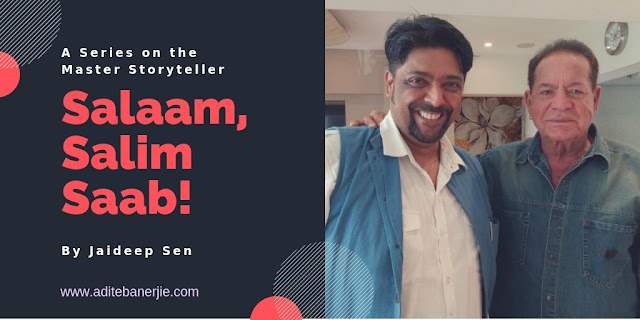By Jaideep Sen
Mere Pass Baap Hain! ....Now that’s something Salman Khan can say with pride in real life because of amongst multiple reasons the one great talent that he’s inherited from his father, Salim Khan Saab, is the Eye to spot special talent like father and son themselves are.
Sanjay Leela Bhansali and Salman Khan
As I watched Gangubai Kathiwadi which personally I feel is Sanjay Leela Bhansali’s Best Film to date, and was swept by its brilliance I instinctively thought of doffing my hat to Salman Khan, through this piece, for giving us this gem of a filmmaker.
 |
| Salim Khan and Amitabh Bachchan |
But in this case Salman did not flinch, stood by Sanjay Bhansali and how! Hum Dil De Chuke Sanam happened and the rest is history. This rock solid support has been acknowledged and thanked by Sanjay Bhansali himself in a latest on camera interview, a sign of a humble genius.
This eye for spotting special talent is a talent Salman Khan has inherited from his father, an institution of writing, Salim Khan Saab.
 | |
| Salim and Salman Khan |
Can you imagine this industry without special talents like Amitabh Bachchan and Sanjay Leela Bhansali? It’s Unimaginable.
So for making it happen, I from the bottom of my heart thank this special father-son duo, Salim Saab and Salman Bhai who had volunteered to back unseen, unheard and unsuccessful names and turn them into the mammoth successes.
And just for this inheritance itself, Salman Khan can proudly say “Mere Pass Baap Hain!”
Jaideep Sen is a filmmaker and a connoisseur of the art of storytelling.
Read his earlier posts in the Salam Salim Saab series:
#3 The Invaluable Value of the Pen
#5 The Forever Burning Flame of Sholay
#6 The Strength of Characterisation
#8 The Sangam of a Genius and his Admirer
#10 Vijay – The Eternal Winner
#11 Let's Celebrate Salim Khan!
#12 The Memorable Women Behind the Angry Young Man
#13 The Definition of a Love Story
#16 Dialogue - the Spoken Word
#17 When Salman Khan Chose to Strip Off his Stardom
#18 The Most Memorable Line of Indian Cinema


Comments
Post a Comment